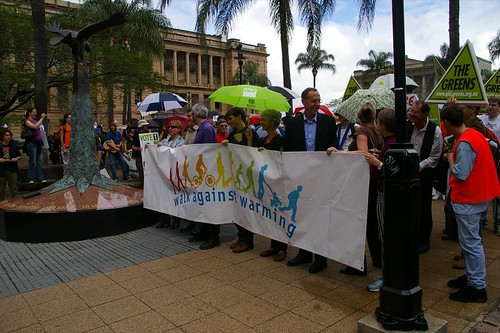CANA Conference Success
Attendance at the 2006 CANA Conference was the largest ever, with nearly 150 attendees at the open session! Reflecting increased awareness of the need for action on climate change, it was noted that "climate change is the new black". And you know what they say about black... (it never goes out of fashion!) Cliches aside, you can have a look at the presentations and notes on
http://www.cana.net.au/index.php?site_var=359.
Revolutionary Solar Technology Moving Offshore
Scientists at the Australian National University have developed solar technology that will cut the cost of solar panels by around 75%. The panels, which use 90% less silicon than normal solar panels, are set to revolutionise the renewable energy market. Unfortunately for Australia, the creators are looking offshore for partners to begin manufacturing the cells, due to insufficient government incentives in Australia.
Canberra Times article
Helping Our Neighbours Fight Climate Change
A new report from the Climate Change and Development NGO Roundtable shows the severe impacts that climate change could have on the Asia Pacific region. This coalition of organisations from both social and environment sectors recommend that Australia reduces its' own greenhouse pollution to avoid the worst of climate change, and use our aid, and other overseas funding, to help countries in the region adapt where possible to theunavoidable impacts of climate change.
For a copy of the reports go to:
http://www.ccdr.org.auGetUp on climate change
After surveying their supporters and finding that one of their main concerns is climate change, GetUp have begun one of their online campaigns on the issue. They are hoping to 'redraw the map of Australia to make the climate crisis personal' by having people sign on and indicate which electorate they are in. Their 'signature' is then added to a map of Australia with the hope that parliamentarians in each electorate will see the importance of climatechange to their constituents... and take action! Their initial target is 250,000 "to create a groundswell for change that cannot be dismissed, trivialised or ignored". Add your 'signature' and spread the word.
getup campaign - ClimateActionNowSunrise joins the campaign to prevent dangerous climate change
Kochy and Mel from Sunrise are running a campaign to get the FederalGovernment to extend the solar rebate (PV rebate program) which is due to run out in June 2007. See
http://sunrisefamily.com.au/current/petition/ and add your support.
Iemma Dilemma Design Competition
NSW Premier Morris Iemma is in the spotlight, with Greenpeace calling on designers, photographers, cartoonists and animators to put their talent touse in depicting "Iemma's Dilemma" - "How can I make it seem like I'm doing something about climate change, without actually doing anything". Their website encourages entrants to "be blunt and to point. Choose freely from awide suite of tools - ridicule, satire, parody and mockery."
For more information, http://www.greenpeace.org/australia/issues/climate-change/take-action/iemma-dilemma to find out more about the Climate Challenge and register for your involvement.
Thank you for reading SeeChange, the monthly bulletin of Climate Action Network Australia (CANA)Thanks again to the sponsors of CANA's 2006 Annual Conference:
www.itsgettinghotinhere.orgwww.asen.org.auwww.youthclimatecoalition.blogspot.com SeeChange is available here...
Read More......











